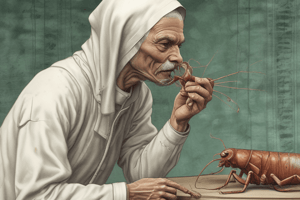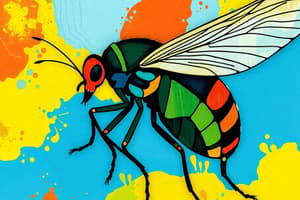Podcast
Questions and Answers
How long can adult fleas remain active inside their cocoon?
How long can adult fleas remain active inside their cocoon?
- 4-12 months (correct)
- 1-3 months
- A few days to a week
- Up to 6 months
How many times their own weight in blood can nymphs ingest?
How many times their own weight in blood can nymphs ingest?
- 6-12 times (correct)
- 4-6 times
- 2-4 times
- 12-16 times
What is the shape of the proboscis of the insect?
What is the shape of the proboscis of the insect?
- Long and zigzagged
- Thin and straight (correct)
- Thick and curved
- Short and stout
What is the primary reason for the bugs' defecation during or soon after feeding?
What is the primary reason for the bugs' defecation during or soon after feeding?
What is the maximum duration a flea can survive without a blood meal?
What is the maximum duration a flea can survive without a blood meal?
Approximately how many species of fleas exist?
Approximately how many species of fleas exist?
What is the average number of eggs laid by a female insect in its lifetime?
What is the average number of eggs laid by a female insect in its lifetime?
What is the main function of the proventriculus in fleas?
What is the main function of the proventriculus in fleas?
Why is it medically important to know that fleas will abandon their host if it dies?
Why is it medically important to know that fleas will abandon their host if it dies?
How long does it typically take for the complete life cycle of these insects to occur?
How long does it typically take for the complete life cycle of these insects to occur?
Where do female insects typically lay their eggs?
Where do female insects typically lay their eggs?
How do fleas move on their host?
How do fleas move on their host?
Why do hungry adults and nymphs sometimes pierce the swollen abdomen of an engorged nymph?
Why do hungry adults and nymphs sometimes pierce the swollen abdomen of an engorged nymph?
What is unique about the flea species Tunga penetrans?
What is unique about the flea species Tunga penetrans?
What is the purpose of the genal combs in some flea species?
What is the purpose of the genal combs in some flea species?
How many nymph instars are there in the life cycle of the insect?
How many nymph instars are there in the life cycle of the insect?
What is the maximum vertical distance a flea can jump?
What is the maximum vertical distance a flea can jump?
What is the typical duration of feeding for these insects?
What is the typical duration of feeding for these insects?
Where do female fleas typically lay their eggs?
Where do female fleas typically lay their eggs?
What is the maximum lifespan of an adult insect in the absence of hosts?
What is the maximum lifespan of an adult insect in the absence of hosts?
How do fleas jump?
How do fleas jump?
What is the typical size of the eggs laid by the female insect?
What is the typical size of the eggs laid by the female insect?
What triggers the emergence of adult fleas from their pupae?
What triggers the emergence of adult fleas from their pupae?
How long does it take for the eggs to hatch?
How long does it take for the eggs to hatch?
What is the most common nuisance flea species in the US?
What is the most common nuisance flea species in the US?
What is the function of the silk produced by larval fleas?
What is the function of the silk produced by larval fleas?
What is one of the main reasons for the medical importance of fleas?
What is one of the main reasons for the medical importance of fleas?
What is the color of the eggs laid by the female insect?
What is the color of the eggs laid by the female insect?
How many blood meals do the nymphs require?
How many blood meals do the nymphs require?
What is the purpose of the flea's powerful hind legs?
What is the purpose of the flea's powerful hind legs?
How many eggs can a female flea lay during her lifetime?
How many eggs can a female flea lay during her lifetime?
How long does the larval period of fleas typically last?
How long does the larval period of fleas typically last?
How do people typically get infected with Chagas disease?
How do people typically get infected with Chagas disease?
What is the number of triatomine species that have been found to be infected naturally?
What is the number of triatomine species that have been found to be infected naturally?
What determines the vector efficiency of triatomine insects?
What determines the vector efficiency of triatomine insects?
Which of the following is a non-pathogenic species of trypanosome?
Which of the following is a non-pathogenic species of trypanosome?
What is the primary host of the trypanosome parasite?
What is the primary host of the trypanosome parasite?
What percentage of triatomines in an area may be infected?
What percentage of triatomines in an area may be infected?
What is another way people can get infected with Chagas disease?
What is another way people can get infected with Chagas disease?
Where is Chagas disease most common?
Where is Chagas disease most common?
Flashcards are hidden until you start studying
Study Notes
Fleas
- Order Siphonaptera: 2200 species, 220 genera, with only a few important to humans
- 94% of fleas bite mammals, while the remainder feed on birds
- Worldwide distribution, with many species and genera having limited ranges
General Taxonomy
- Medically important genus: Xenopsylla
- Other genera with medically important roles: Ctenocephalides (hosts for cestodes)
- One flea species (Tunga penetrans) "burrows" into people's feet
Morphology
- Adults: 1-6mm, oval shaped, compressed laterally, light to dark brown, with small bristles and spines
- Lack wings, but have powerful legs, with hind legs specialized for jumping
- Females: tip of the abdomen is more rounded
- Head: triangular, with conspicuous eyes, club-shaped antennae, and mouthparts pointing downward
- Some species have tooth-like spines called genal combs
Role of Blood Feeding
- Both sexes take blood meals, with saliva injected during feeding containing anticoagulants
- Blood sucked through pharynx into proventriculus, with backwards pointing spines to prevent regurgitation
- Proventriculus is important for disease transmission
- Blood enters mid-gut for digestion
Life Cycle
- Female deposits eggs in debris or detritus, often in habitat or dwelling where host lives (nest, burrow, etc.)
- Eggs: small (0.1-0.5mm), oval, yellow or white, with female laying 300-1000 eggs during her lifetime
- Eggs hatch after 2-5 days, with legless larva emerging
- Larval period: 2-3 weeks, may be up to 200 days
- Pupae: white cocoon made of silk, with silk being sticky and picking up bits of dust, dirt, and debris
- Adults emerge after 2-3 weeks, with stimulus required for emergence usually being a vibration of an animal moving nearby or carbon dioxide
Adults
- Can live anywhere from 10 days to 12 months
- Avoid light, usually hiding among the hair or feathers of the host (or clothing, in beds)
- During feeding, feces are evacuated to make room for blood meal
- Presence of flea feces (sometimes partially digested blood) can be seen in bed linens of infested houses
Host Specificity
- Most fleas have a slight preference for a specific host, but will bite other hosts when their preferred host is absent
- If a host dies, fleas will abandon host for a new one
- Some fleas can tolerate desiccation, starvation (up to 6 months), and can jump up to 20cm vertically or 30cm horizontally
Medical Importance
- Four main reasons for medical importance: Nuisance, Plague, Murine Typhus, and Cestodes
- Nuisance aspect: flea bites result in discomfort, swelling, and irritation, with cat fleas being the most common nuisance species in the US
Studying That Suits You
Use AI to generate personalized quizzes and flashcards to suit your learning preferences.




